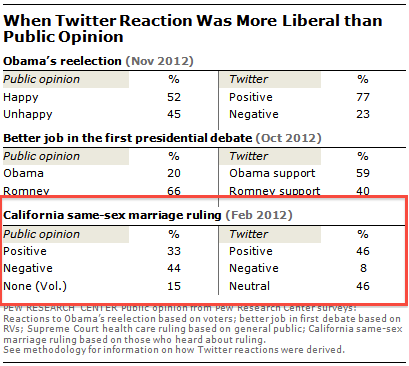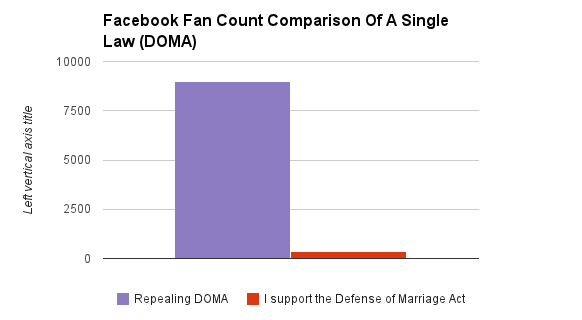The religious right isn’t having a good year: the new Republican National Committee roadmap almost entirely excludes religious issues, a majority of young conservatives support same-sex marriage, and hard-line libertarians are dominating the conservative agenda with small government policies.
As the Internet becomes the hub of political dialogue, religious issues are being drowned out by the most powerful voices on the web, which overwhelmingly support marriage equality and a woman’s right to choose.
One graph, below, on the lopsided nature of Twitter, shows how opponents of a same-sex marriage ruling in California were virtually non-existent on social media, even though they held the lion’s share of public opinion.

Three Internet principles, in particular, will continue to erode the religious right’s political power: the Internet culture’s embrace of free expression, libertarian social media prowess, and the need to recruit young talent.
The Internet Loves Love
As a technology built on free expression, the Internet tends to promote political issues that share its foundational values. Stories of positivity and social connection are more likely to be passed down from friend to friend; “when you share a story with your friends and peers, you care a lot more how they react. You don’t want them to think of you as a Debbie Downer,” said University of Pennsylvania social psychologist, Jonah Berger, who studies the content of viral stories.
Indeed, a quick comparison of the Facebook fan count of similar pages reveals a struggling religious right. On both single-issue pages (the Defense of Marriage Act) and general marriage beliefs (Gay Marriage USA vs. The Family Research Council), pro same-sex marriage groups have between 3 and 30 times more supporters.


For Gay Marriage USA, engagement is through the roof. A picture of a rainbow-painted house across the street from the Westboro Baptist Church got 100 times more shares than the Family Research Council’s recent top update, a prayer request for the Supreme Court.

The religious right has struggled to spin their issues into affirmations. “Defense of marriage,” and “pro-life” still seem stuck with an anti-equality, anti-choice perception. Fewer netizens want to publicly engage with their views, and, as a result, they’re being erased from online discussions.
Libertarians Thrive In Chaos
The grassroots, small-government tea party movement — love ’em or hate ’em — is an inescapable political force. After taking down establishment Republican candidates, such as long-time moderate icon Richard Lugar, the GOP’s rhetoric took a sharp, fiscally thrifty turn. Indeed, the new official Republican roadmap almost entirely ignores the social issues once central to conservative politics. “The report didn’t mention religion much, if at all,” lamented Tim Wildmon, president of the American Family Association, who worries the GOP is abandoning the religious right with its new direction.
The libertarian coup began on the web. Mark Meckler, one of the founders of the Tea Party movement, explains to me, “Because folks who participate tend to be so individualistic, what started to happen is, without anybody telling them, they immediately started to spawn hundreds and then ultimately thousands and then millions of web pages dedicated to tea party activity.”
That is, the very principles of get-off-my-lawn individuality that condemn government interference in citizens’ social lives also allow libertarian groups to thrive on the chaotic web. While Twitter and Facebook may not have much of an impact on general elections, the Internet is an extraordinary tool for disparate, latent interests to organize (especially during political primaries). It was outside the party machine, and its tenured religious partners, where tea partiers organized rallies and, eventually, selected their own candidates.
“It took the structure of the Internet, as the web existed, and it allowed us to create relationships and spread knowledge that would not have otherwise been possible,” concludes Meckler.
Sweet, Sweet Young Brains
Young citizens may not vote in consequential numbers, but they’re overwhelming the best hackers and online content producers. Apple, Google and Facebook have all taken a rare public position supporting gay marriage, largely due to pressure from their own young employees.
“By singling out a group for less favorable treatment, Proposition 8 impedes businesses from achieving the market’s ideal of efficient operations — particularly in recruiting, hiring and retaining talented people who are in the best position to operate at their highest capacity,” wrote a contingent of top tech companies in a brief to the Supreme Court’s upcoming decision on a California law that banned same-sex marriage, Proposition 8.
The GOP, especially, has found it near impossible to recruit the best programmers. “It’s hard to side with a party that’s still trying to reach out to their base of creationists,” said Johnvey Hwang, a 34-year-old San Francisco software engineer who volunteered for President Obama in 2012.
Hwang was most likely referring to a string of viral anti-science videos that emerged out of Republican officials saying things like the theory of evolution are “lies straight from the bit of Hell.”
A Struggle For The Future
As the GOP struggles to regain its footing with bright young programmers and the growing libertarian grassroots movement, it’s no shock that they aren’t presenting themselves as a pro-traditional marriage, pro-choice, creationist party — even if the party elders hold those beliefs.
Most importantly, only issues that are discussed can be a public priority. And, since conservative social values are in a social media black hole, the Internet is erasing the religious right from the national discussion and, ultimately, politics.
